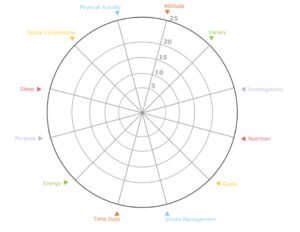When I enrolled at Harvard, beyond acquiring knowledge, my goal was to meet new people. That's exactly what happened. Three countries separate us (Africa, United States, Canada), and many hours of time difference, but our common interests brought us together, and I am proud to introduce to you a very ergonomic tool that I had the chance to discover through my colleagues.

Figure: Paving Wheel (Harvard Health Publications 2017)
Remote work has become increasingly prevalent in today's workforce, bringing with it unique challenges in terms of work-life integration. The importance of mindfulness in managing stress and promoting overall well-being cannot be overstated. This article delves into the world of mindfulness techniques tailored to remote work environments. We explore how mindfulness, coupled with selfcompassion principles and practices such as 'End-of-Day Reflection and Transition,' offers a powerful strategy to mitigate stress. Empirical studies validate the effectiveness of mindfulness in reducing stress, underscoring its significance for enhancing mental health and resilience in remote work settings (Бабенко et al., 2019, p. 2). These techniques of mindfulness collectively contribute to effective stress management and the overall holistic well-being of remote workers Balancing Life’s Journey The Wheel of Life for Remote Workers offers a tool for remote workers to navigate the rollercoaster of life. This wheel divides life into key aspects like work, relationships, and health, aiding in identifying strengths and areas needing attention. Balance is crucial for remote workers, ensuring a smoother journey through work and life. Regularly using the Wheel of Life enables remote workers to lead balanced, fulfilling lives while excelling professionally within the framework of work-life integration. It supports well-being through effective strategies like self-care, breaks, and mindfulness, recognizing the importance of physical and mental health. Please see Appendix 1 for the actual score sheet for the Wheel of Life.
Six modules are introduced in the sections below as markers of where you may improve your wheel so it is smooth to run your life pathway.
Module 1: Remote Work Wellness: Activity and Stress Management
In remote work, where prolonged sitting and screen time are common, incorporating physical exercise into daily routines is essential for managing stress. By combining physical activity with mindfulness, remote workers can improve their well-being significantly, as it is stated that "exercise is the single most powerful tool you have to optimize your brain function (Ratey, 2008)." This integrated approach tackles the challenges of remote work and offers a comprehensive solution to reduce stress, enhance focus, and maintain overall health.
Short, intentional movement breaks are an effective remedy for the physical tension that builds up during extended remote work sessions. Desk stretches are easily accessible and provide quick relief for muscles and joints. Additionally, taking a brisk walk can invigorate both the body and mind. One practical method to incorporate mindfulness into the workday is through "Desk Yoga1 ," which consists of desk-based exercises. These exercises offer a much-needed break from a sedentary routine, help release physical tension, and enhance mental clarity.
Module 2: Attitude and Time Outs
To be a satisfied performer, cultivating an optimistic outlook counterbalanced with mindfulness is crucial (Bunjac et al., 2021). Constantly worrying leads to a defensive, pessimistic attitude that hinders productivity. Taking breaks of 10 minutes or less improves well-being, breaks the autopilot cycle, and increases performance (Albulescu et al., 2022). Breaks longer than 10 minutes can boost performance. It is important to personalize breaks and adapt them to the type of tasks performed.
Module 3: Variety and Energy
Engaging in a variety of activities like trying new foods, eating fruits, exercising regularly, and meeting diverse friends improve work-life integration (Ya, 2021). A diverse diet improves health and cognitive function, while exercise releases endorphins, boosting mood and reducing stress (Beckel & Fisher, 2022). Socializing with different friends and participating in hobbies enhance well-being and work performance (Kohll, 2018). Maintaining clear work-personal life boundaries is crucial (Elazab, n.d.).
Module 4: Investigation and Purpose
Practicing self-care using the RAIN method increases self-awareness (Sezer et al., 2022; Brach, n.d.). Mindfulness improves attention regulation, emotion regulation, and control of physical activation, leading to increased resilience and well-being (Sezer et al., 2022). Mindfulness changes our decisions and brains, improving our ability to regulate physical symptoms and reducing psychiatric symptoms (Sezer et al., 2022).
Module 5: Nutrition and Sleep
Maintaining a balanced and nutritious diet enhances work-life integration and overall health (Beckel & Fisher, 2022). A healthy diet positively affects cognitive performance and mental well-being (Klímová et al., 2020). Good sleep habits like getting 7-8 hours of sleep and avoiding late-day caffeine are important for work-life integration (University of Wisconsin Integrative Health, 2019).
Module 6: Goal Setting and Social Connections
Goal setting plays a significant role in employee engagement and productivity in remote work (Straus et al., 2022). Sharing goals with someone provides accountability and support, helping remote workers stay focused (Straus et al., 2022). Establishing shorter-term goals offers a structured framework for managing work and personal life (Straus et al., 2022). Cultivating positive social connections is crucial for enhancing job satisfaction (Straus et al., 2022). Goal setting and social engagement improve overall well-being and productivity, reducing stress and achieving a balance between ambition and well-being in remote work. Co-living spaces offer work, travel, and social interaction in one place, catering to diverse lifestyles and needs. These spaces integrate co-working with built-in communities, promoting seamless work-life integration and fostering a sense of belonging2 . Some spaces are designed for families, accommodating various living arrangements.
Challenges faced by remote workers
As we shift our focus to the challenges faced by remote workers, it becomes evident that these elements take on even greater importance in addressing the unique obstacles associated with remote work. Remote workers frequently encounter difficulties in setting clear boundaries between their work and personal lives, experience isolation and loneliness due to the absence of traditional office interactions, and often grapple with time management and discipline due to the absence of direct supervision. To effectively overcome these challenges, trust-building with managers and teammates becomes essential, alongside efforts to eliminate feelings of isolation and loneliness.
Conclusion
In conclusion, as remote work offers unparalleled flexibility and convenience, it's crucial to acknowledge and address the unique challenges it poses. Mindfulness, inspired by Langer, emerges as a powerful tool for remote workers, enabling effective stress management and the cultivation of a sense of balance. By embracing mindfulness and nurturing meaningful connections with colleagues and supervisors, remote workers can create a supportive work environment that contributes to their personal and professional growth. As remote work continues to shape the future of employment, integrating these principles becomes essential for maximizing potential and success in this evolving landscape. Additionally, co-living arrangements can further enhance collaboration and camaraderie in the remote work community, fostering a sense of togetherness even in virtual workspaces.
Have a WelloW day!
Team Mindfulness for Work: Mariko Numasawa, Lona Rodriguez, Krystel Parenteau xXx


